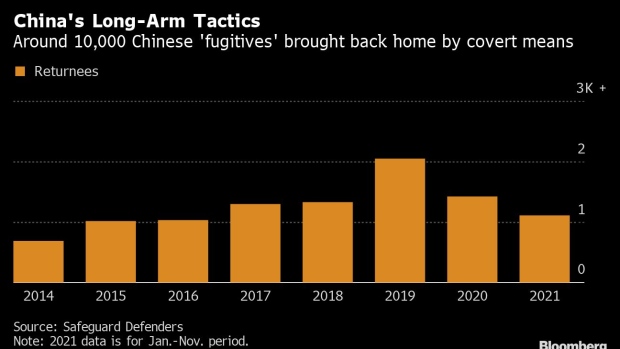Jan 18, 2022
China’s Global Dragnet Grinds On After Bringing Back 10,000 Overseas ‘Fugitives’
, Bloomberg News

(Bloomberg) -- China has relied on coercion, including kidnapping and pressuring families, to force some 10,000 “fugitives” to return from overseas, according to a new report that sheds light on a campaign that has stoked diplomatic tensions around the globe.
Chinese efforts to repatriate accused criminals netted 9,946 people since President Xi Jinping launched the initiative more than seven years ago, official data compiled by Safeguard Defenders show. The statistics were released Tuesday as part of a broader report on the program by the Madrid-based human rights group, which found most returns China calls “voluntary” relied on covert or extrajudicial means to force those targeted to come back.
The repatriation push peaked at 2,041 in 2019 before the pandemic curbed travel and diplomatic exchanges around the globe, according to data released by anti-corruption authorities and published by state media. Nonetheless, the returns have continued, with 1,114 reported by the National Supervisory Commission in the first 11 months of last year.
The campaign has spanned more than 120 countries, including Australia, Canada and the U.S. -- destinations popular among those sought by Beijing because of their perceived reluctance to cooperate with Chinese law enforcement demands. Disputes over such repatriation efforts have occasionally emerged, something that could increase as Western governments push back against what they view as human rights abuses intended to quash political opposition.
Safeguard Defenders urged nations to take efforts to better track and prevent what the group argues would be more accurately described as “involuntary” returns within their borders. The group is calling on governments to suspend extradition treaties with China to protest the “clear violation of international norms and national sovereignty of target countries.”
“Involuntary returns are a cornerstone in the expansion of China transnational repression, yet the phenomenon is little known in the West,” said Safeguard Defenders. The group’s director, Peter Dahlin, was held in a “black jail” -- an extralegal detention center -- for more than three weeks in 2016 on accusations of spreading “negative information about China” and was released after making a confession on state television.
China has rejected criticism of its methods to bring Chinese nationals home for punishment, with a Foreign Ministry spokesman saying in July that “repatriating corrupt fugitives and recovering illegal proceeds” are just causes to “uphold and promote” the rule of law. Beijing has dismissed U.S. efforts to question its practices as an attempt to smear China.
The 68-page report represents one of the most comprehensive looks yet at a campaign that Xi launched under the name “Operation Fox Hunt,” originally focused on capturing some 18,000 officials believed to have fled overseas. The campaign has since been institutionalized and taken over by the NSC, an anti-graft body created in 2018 with oversight of millions of Communist Party members and public employees.
While China has secured some targets through extradition, deportation and other agreements with the countries where they were living, many have been brought back by three extra-judicial methods. Those include pressuring family in China, sending agents overseas to directly intimidate the target and kidnapping.
The report details 62 individual cases that illustrate the various approaches, including some that have fueled diplomatic controversy:
- Daniel Hsu, a U.S. citizen, was barred from leaving China for four years in what he described as an effort to pressure his father to return and face allegations of embezzlement. He was released in November, in a move that coincided with Xi’s video summit with U.S. President Joe Biden.
- Zheng Ning, a former executive of a state-owned enterprise, agreed to return from France in 2017 after visits from undercover Chinese agents. France complained that the agents were acting without the country’s knowledge or a formal extradition request.
- Gui Minhai, a Swedish-Chinese writer, went missing in Thailand in 2016 as part of string of disappearances related to group of Hong Kong booksellers that sold works critical of the Communist Party. He later resurfaced in Chinese custody, where he made videotaped confessions, and was imprisoned for 10 years for “illegally providing intelligence overseas.”
Although it was unclear what share of the individuals were brought back by such tactics over the entire period, an official breakdown for 2018 showed that “voluntary returns” accounted for almost two-thirds of cases that year. An official legal interpretation of the law that outlined the NSC’s powers listed “persuasion” as a method that could “avoid the complicated legal procedures and long judicial cooperation procedures of the countries where fugitives hide.”
Commission agents can also employ “irregular methods,” according to the 2018 interpretation published by the agency. “In practice, kidnapping or trapping and capturing are rarely used,” the document said, noting that such actions prompt diplomatic disputes.
“The main purpose of Xi isn’t just to get these people back to China -- it’s to prevent Chinese high-level government officers from escaping from China,” said Gao Guangjun, a New York-based attorney who has represented people targeted by Beijing’s exit bans and Interpol red notices. “He wants to show even if you escape to the U.S., I can still get you back to China.”
Safeguard Defenders said what was initially billed as an anti-corruption operation has increasingly been used to pursue political dissidents such as Falun Gong practitioners. The report cited a 700% increase in asylum requests from China between 2012 and 2020, according to data from the UN High Commissioner for Human Rights, as evidence that many sought by China might be fleeing political crackdowns.
“Foreign governments must ensure all diplomatic discussions on these issues take place in an open, transparent and public space and, where possible, expose activities carried out on its soil by overseas agencies that violate its judicial sovereignty,” the report said. “Without transparency, violators are encouraged to continue and expand their activities. Silence will increase the transgressions, not reduce them.”
©2022 Bloomberg L.P.





